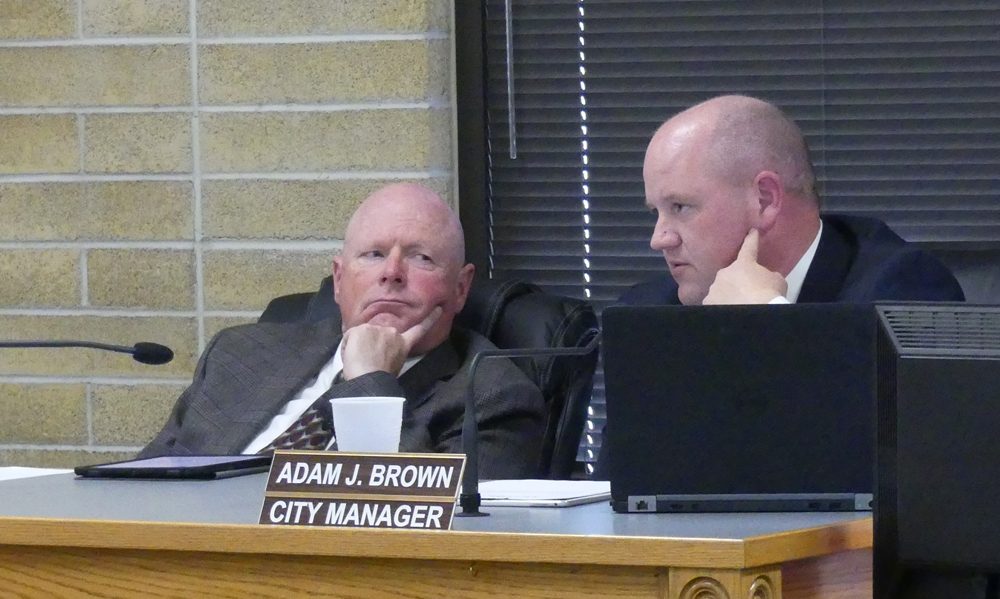 City Manager Adam Brown (right) provides input during Ontario City Council deliberations while Larry Sullivan, city attorney, listens. (The Enterprise/Max Egener)
City Manager Adam Brown (right) provides input during Ontario City Council deliberations while Larry Sullivan, city attorney, listens. (The Enterprise/Max Egener)
ONTARIO – Ontario city officials said Monday they encourage city councilors to comply with public records law, but they stopped short of saying city councilors are required to do so.
In a statement Monday, City Manager Adam Brown acknowledged the city recently staked a position that city councilors weren’t subject to the law. The law is designed to give citizens access to information about how their government functions.
That position would be at odds with recent court cases in Oregon. The state records law states: “Every person has a right to inspect any public record of a public body in this state,” provided there is no legal exemption.
Brown in his statement Monday said, “The City of Ontario’s policy is to comply with any reasonable public records requests that are directed to the City and to encourage public officials associated with the city to cooperate with such requests.”
In August, the Enterprise requested records from the city and Councilor Marty Justus regarding the councilor’s involvement in a donation from the marijuana business Hotbox Farms to the Friends of the Aquatic Center for a city splash pad project. The city provided the documents while Justus initially provided one document and said he was consulting his personal attorney. He later posted emails on Facebook that he said addressed the Enterprise’s request.
He did so after sharing advice from his attorney, Max Taggart of Ontario, which concluded Justus wasn’t subject to the public records law.
“You are not a public body,” Taggart wrote in an email to Justus, which was forwarded to the Enterprise. “If you were a public body, you are not a custodian. The writings which you have are not public records. The request of the Malheur Enterprise is best directed to and answered by the city of Ontario.”
Brown wrote in turning over other city records that “the possibility exists that there are additional emails for which Marty alone would be the custodian and be responsible to produce subject to PRR (public records requests).”
Brown subsequently forwarded Taggart’s opinion to City Attorney Larry Sullivan for review.
“I agree with Max Taggart that Marty Justus is not a public body,” Sullivan wrote to Brown in an email dated Aug. 29. “Nor is he the custodian of records of a public body. Some of Marty Justus’s emails may qualify as public records, but it would only be those emails that are in the custody of the City of Ontario as the custodian of a public body.”
The law defines a public records custodian as the person or entity in possession or control of public documents.
Ginger McCall, an attorney and the state public records advocate, said Ontario’s interpretation is unprecedented.
She said that she hasn’t seen city officials interpret the law this way. She was appointed to the advocate’s job earlier this year by Gov. Kate Brown.
“This is a very creative way to interpret the law,” McCall said. “It’s just wrong.”
“I do find this interpretation to be very troubling,” McCall said.
The city would be removing an important element of its government from public oversight, according to McCall.
“This is a really important issue because the accountability of elected officials that is written into the law is one of the best aspects of Oregon public records law,” McCall said. “It’s not something all public records laws have and it’s certainly something worth fighting for.”
She said that “there are court cases that have dealt with this question and it’s pretty much taken as a given that city councilors are subject to Oregon public records law,” McCall said.
In an email to Brown, McCall cited a recent Multnomah Circuit Court ruling regarding a public records request to Portland Mayor Ted Wheeler, who serves as a member of city council.
The judge “clearly found that the mayor, a city councilor, was subject to the public records law,” McCall wrote.
Kevin Toon, communications director for the League of Oregon Cities, of which the city of Ontario is a member, said he is unaware of any instances in which city councilors were declared not to be public bodies for the purpose of the law.
When asked specifically about whether Ontario’s position goes against league policy, Toon said, “We do not comment on the conduct of our member cities.”
The Oregon School Boards Association said it considers school board members subject to the public records law.
The city’s statement on public records:
“On August 21, 2018, the Malheur Enterprise emailed a Public Records request to City Councilor Marty Justus. It was sent to him personally. Questions were raised as to whether individual city council members had to personally respond to Public Records requests. City Attorney Larry Sullivan initially concluded that the Public Records law did not explicitly compel individual city council members to comply with Public Records requests. However, Councilor Justus did not oppose giving the documents that the Enterprise requested, and the issue was resolved by complying with the Public Records request.
The City of Ontario did not oppose the Public Records request sent to Councilor Justus, and cooperated in providing the information requested. The City of Ontario’s policy is to comply with any reasonable Public Records requests that are directed to the City and to encourage public officials associated with the City to cooperate with such requests.”
Reporter Max Egener: 503-853-6476 or [email protected]. Twitter: @maxegener




